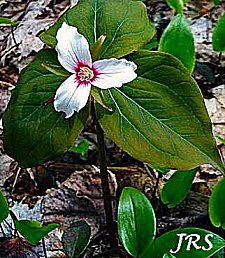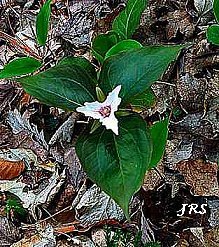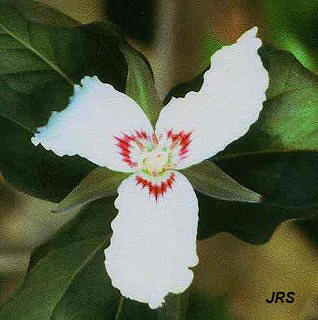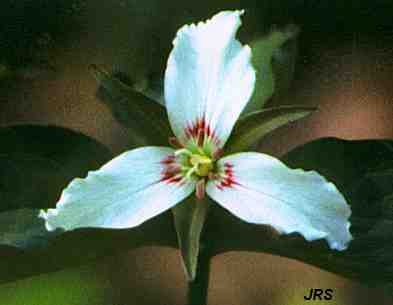|
|
|
|
 being located
on the western edge of the Painted Trillium range in
North America.
Some references indicate the next closest location as Vermont. The distribution of the species is
extremely limited by unique habitat requirements, and by habitat destruction
resulting from development. In Saint Clair County, Painted Trillium grows
only in cool, acidic sands in mature second-growth
forests of Red Maple, Paper Birch, Eastern Hemlock, and Eastern White Pine. Typical plant associates are Bracken Fern, Wintergreen, Bunchberry, Bristly
Dewberry, Fringed Polygala, Partridgeberry, Goldthread, Canada Mayflower,
Indian Cucumber-root, Clintonia, Wild Sarsaparilla, Starflower, and Lycopodium, giving the forest a distinct northern
quality for southeastern Michigan. It seems that Painted being located
on the western edge of the Painted Trillium range in
North America.
Some references indicate the next closest location as Vermont. The distribution of the species is
extremely limited by unique habitat requirements, and by habitat destruction
resulting from development. In Saint Clair County, Painted Trillium grows
only in cool, acidic sands in mature second-growth
forests of Red Maple, Paper Birch, Eastern Hemlock, and Eastern White Pine. Typical plant associates are Bracken Fern, Wintergreen, Bunchberry, Bristly
Dewberry, Fringed Polygala, Partridgeberry, Goldthread, Canada Mayflower,
Indian Cucumber-root, Clintonia, Wild Sarsaparilla, Starflower, and Lycopodium, giving the forest a distinct northern
quality for southeastern Michigan. It seems that Painted
 Trillium and its
northern forest habitat are remnant of a cooler post-glacial period in the
Port Huron area. Many
have confused other trillium species with Painted Trillium; White Trillium
with aging pinkish petals or green stripes from a common mycoplasma
infection, or Red Trillium. But
Painted Trillium is a distinct and uncommon species (see left). Trillium and its
northern forest habitat are remnant of a cooler post-glacial period in the
Port Huron area. Many
have confused other trillium species with Painted Trillium; White Trillium
with aging pinkish petals or green stripes from a common mycoplasma
infection, or Red Trillium. But
Painted Trillium is a distinct and uncommon species (see left).As far as we are aware, this is the last Painted Trillium site that can be purchased in Michigan. Not only is this land important for Painted Trillium, but for the many other woodland species that depend on this forest. If you want to help preserve a unique natural heritage of Saint Clair County and Michigan, this is it. Please consider sending generous donations to: Michigan Nature Association, All donations are tax deductible. Make checks payable to "Michigan Nature Association", and please write "Painted Trillium property" on the memo line. If you have any questions or need additional information please contact: Jeremy Emmi, Executive Director, Michigan Nature Association at 517-655-5655; Bill or Cheryl Collins at 248-852-4682; or the Blue Water Audubon Society web site at www.bluewateraudubon.50megs.com The Sharon Rose Leonatti Memorial Nature Sanctuary
On November 28, 2001, Sharon Rose Leonatti, 28, was
working door-to-door in Port Huron Township for Clean Water Action, a
non-profit environmental organization, when she was hit and killed by a car
only a short distance from the Painted Trillium property. |
|
|
The Painted Trillium has been steadily declining throughout its range with human development being a primary reasons. It is listed as Endangered in Michigan. The remaining 6 confirmed locations of the Painted Trillium in the our state are all in Saint Clair County, with at least 4 are in Kimball Township.   Wanted Alive Painted Trillium flowers are singular with three white petals and red or purplish stripes at the base. The leaves are whorled at the top of the stem and the length of the stem is1/4 to1/2 inches long. The height of plant is to 12 inches and it blooms from mid-May till early June. Its habitat is mature deciduous forests with Eastern Hemlock, Eastern White Pine, Paper Birch, and Red Maple on cool acidic sandy soils, usually near swamps. The plant is also known as Smiling or Striped Wake-robin, Painted Lady, Sarah, and Wild-Pepper. Ants disperse the seeds of trilliums. Ants are attracted to a small white structure attached to the seed called an "elaiosome" which is rich in oil content and emits a chemical attract ant that puts ants into a frenzy! Ants eat the elaiosome, discarding the seeds in their tunnels where they will later germinate. We need to be watching for this plant when outdoors. |
|
|